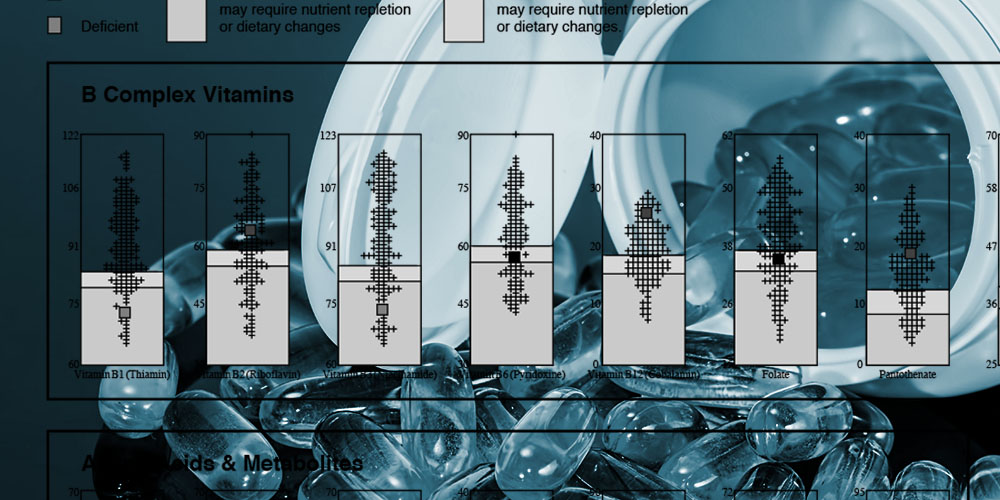Written by Myles Spar
Posted on: September 13, 2018
Share This

If you have even a fleeting interest in nutrition, you probably know that the best way to get the vitamins, minerals, and other nutrients you need to function optimally is through food. In spite of our best intentions, though, most of us don’t eat as well as we should. Whether you travel for work or just work a lot, many of us don’t have time to shop for groceries (much less cook healthy meals with them), so chances are your diet is lacking. And even if you do eat well, unless you are eating all organic all the time, you could still be missing key nutrients. That’s why I’m a big proponent of micronutrient testing. Knowing you body’s deficiencies can change your health because a few simple tweaks can fix problems you didn’t even know you had. Here are some important nutrients that you might be missing.
Vitamin D
According to the Second National Report on Biochemical Indicators of Diet and Nutrition in the U.S. Population published by the CDC, approximately 66 million people are deficient in vitamin D. Why are so many of us suffering from low levels of this vital nutrient? As physician, author, and supplement expert Tieraona Low Dog, MD, points out, vitamin D is often called “the sunshine vitamin” because our bodies use solar energy to convert a chemical in our skin to vitamin D3. She explains that our desire to protect ourselves from the sun’s damaging rays has led to an avoidance of sun exposure and a rise in sunscreen use—and a mere SPF 8 can block up to 95% of vitamin D production. So what happens when you don’t get enough vitamin D? Healthline reports that not only can it cause muscle weakness and bone loss, D deficiency may weaken your immune system and has been associated with increased cancer risk. Other research suggests low levels of vitamin D could up your chances of developing cardiovascular disease.
Magnesium
Because it plays a role in hundreds of biological processes, this mineral is crucial for good health. Unfortunately, many of us are deficient—men only consume around 80 percent of the recommended daily magnesium allowance (400 milligrams) according to nutrition surveys highlighted by NBC News. Much like vitamin D deficiency, low levels of magnesium have been linked to heart problems. One study found that people with magnesium insufficiency are more likely to have high levels of C-reactive protein, an indicator of cardiovascular disease risk. (For more on C-reactive protein and the importance of having your levels checked, see my post here.)
Zinc
This essential trace mineral affects testosterone levels, and zinc deficiency has been linked to hypogonadism (low testosterone). Research suggests supplementing with zinc can help modulate testosterone levels, and it has also been shown to help with sexual competency and erectile dysfunction. Because I know how important zinc is for men’s health, I mention it here as one of my top supplements to increase sex drive and here as an option for helping to treat erectile dysfunction. LIVESTRONG explains that, aside from contributing to sexual health issues, zinc deficiency can reduce immune function, impair memory, and negatively impact exercise performance.
The micronutrient deficiencies I’ve discussed here are but a few of the many that can affect your health, preventing you from being the best version of yourself. What’s even more troubling than how common micronutrient deficiencies are is the fact that most people don’t experience any obvious symptoms, meaning you may never know what you’re missing. Whether you’re an athlete looking to achieve a personal record or an executive seeking the stamina needed to reach the next level at work, you’re much more likely to achieve your goals when your body has the nutrients it needs to perform optimally.
Micronutrient testing like the kind offered by Tack180 can help you understand exactly what you need to reach your peak. Beyond that, we can tailor a unique diet and supplement plan to help you fill in any gaps. Why waste time and money on expensive supplements that you may not need when micronutrient testing and knowing your body’s deficiencies can change your health?

About Myles Spar, MD
Myles Spar, MD, MPH is board-certified in Internal Medicine and in Integrative Medicine. As a clinician, teacher and researcher on faculty of two major medical centers, he has led the charge for a more proactive, holistic and personalized approach to care that focuses on cutting edge technology and preventative care. Dr. Spar has traveled with the NBA, presented a TEDx Talk, appeared on Dr. Oz, and been featured in publications such as the Men’s Journal and the Los Angeles Times.
